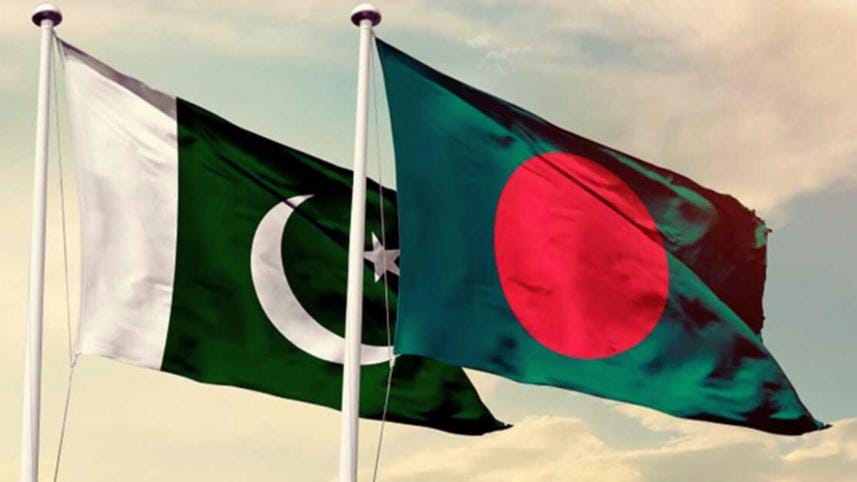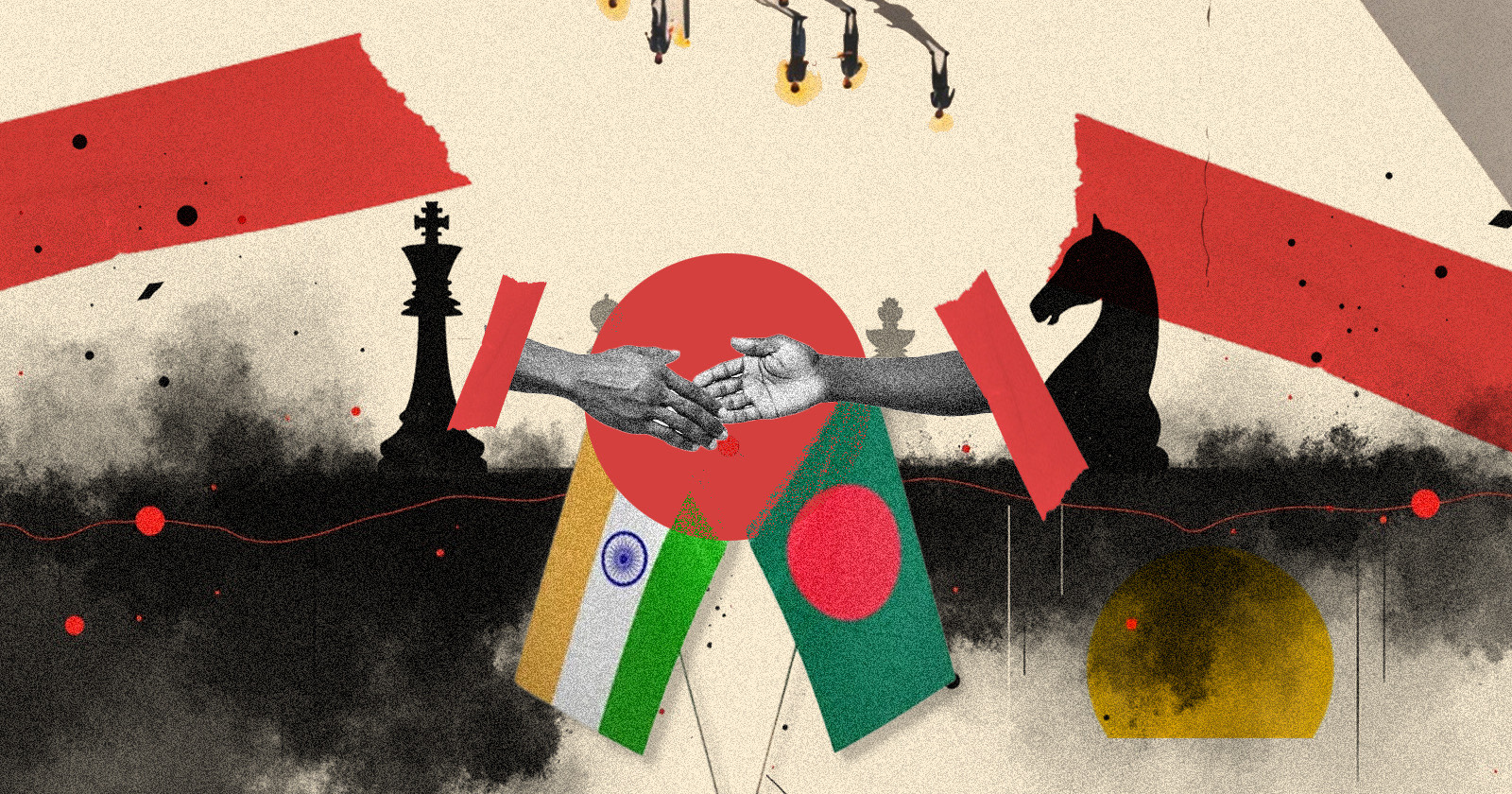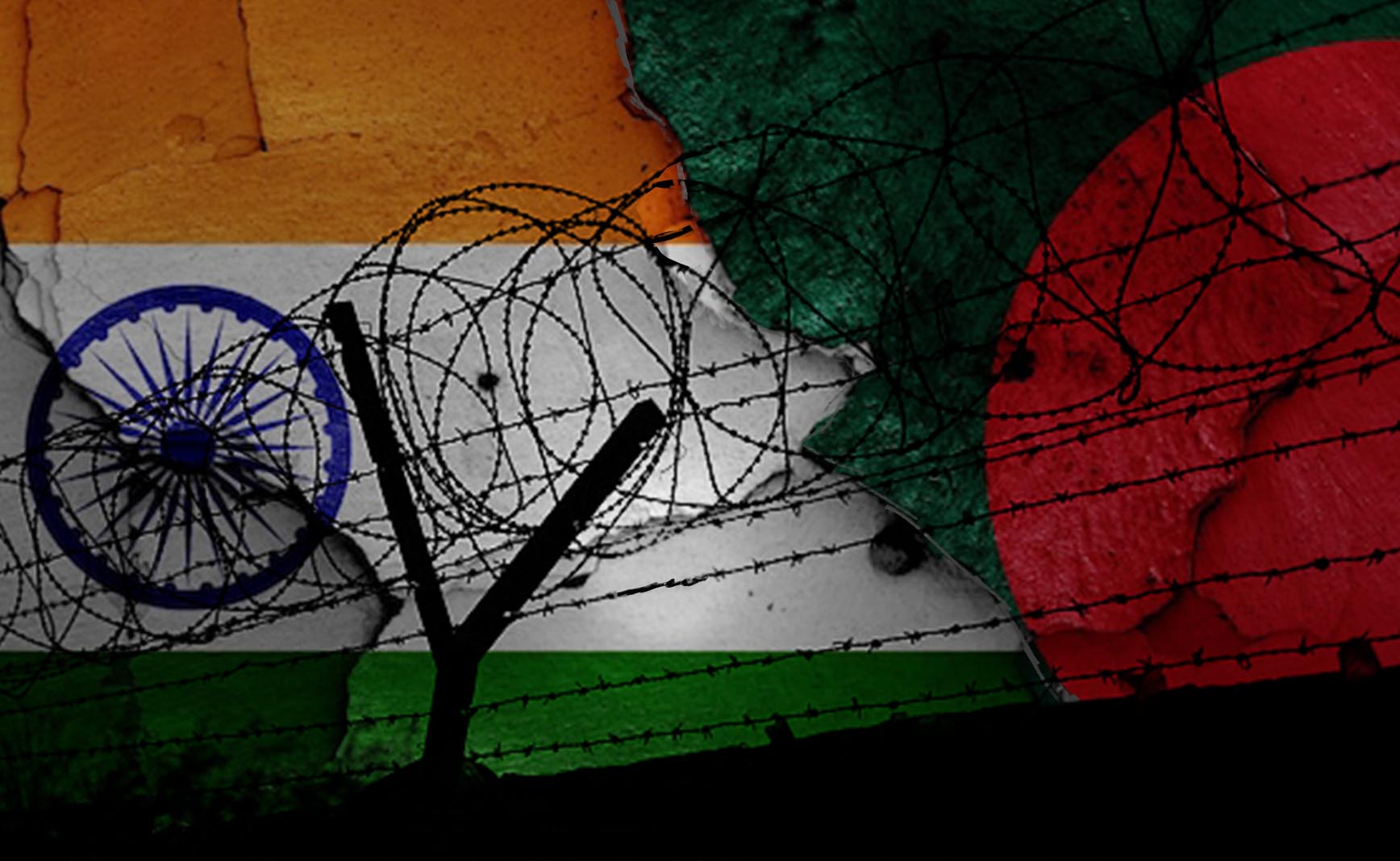Bangladesh-Pakistan relations: Reassessing the past, reimagining the future

On Saturday, Pakistan's Deputy Prime Minister and Foreign Minister Ishaq Dar arrived in Dhaka for a two-day bilateral mission. His visit overlaps with that of Commerce Minister Jam Kamal Khan, who arrived on a four-day trip on August 21. During these high-level engagements, Dhaka and Islamabad are expected to sign several agreements, including provisions for visa-free travel for diplomatic and official passport holders, cooperation between their respective Foreign Service Academies, and the establishment of a Joint Working Group under the two commerce ministries. Other possible instruments include the renewal of a cultural exchange memorandum of understanding (MoU) and a media cooperation agreement between the Bangladesh Press Institute and the Associated Press of Pakistan.
The countries' two foreign ministers are scheduled to meet on Sunday, August 24, followed by a formal signing ceremony. Later that afternoon, Ishaq Dar is expected to pay a courtesy call on Chief Adviser Muhammad Yunus. These meetings and agreements, blending trade diplomacy with cultural and institutional cooperation, represent more than ceremonial symbolism. They mark a deliberate attempt to reset bilateral relations on a broader foundation encompassing political, economic, and social dimensions. For two countries bound by a turbulent and intertwined history, this moment offers an opportunity to revisit the past, recalibrate the present, and reimagine the future.
The timing of the visits could not be more significant. Bangladesh is currently governed by an interim administration led by Muhammad Yunus, whose declared policy of "friendship to all" marks a sharp departure from Awami League's India-centric diplomacy. In less than a year, Dhaka and Islamabad have re-established high-level communication, revitalised economic ties, and even begun to explore nascent military cooperation.
Yet history cannot be set aside so easily. For Bangladesh, the legacy of the 1971 Liberation War remains etched into its national consciousness. For Pakistan, sensitivities surrounding a formal acknowledgement of its wartime atrocities persist, with Islamabad continuing to view the 1974 Tripartite Agreement (with India being the third party) as a final settlement. This unresolved discord is both a visible obstacle and the defining backdrop to any future rapprochement.
During Sheikh Hasina's premiership, relations between Bangladesh and Pakistan remained deeply strained for much of her 15 years of rule. The establishment of the International Crimes Tribunal in 2009 to prosecute 1971 war crimes and the subsequent execution of several Jamaat-e-Islami leaders drew sharp condemnation from Pakistan, which dismissed the trials as politically motivated. Dhaka's consistent demand for a formal apology further fuelled tensions. Awami League also actively leveraged anti-Pakistan rhetoric as a tool of domestic legitimacy, in sharp contrast to Bangladesh Nationalist Party (BNP), which historically maintained more cordial ties with Islamabad.
The August 2024 changeover brought an immediate shift in tone. Within months, Prime Minister Shehbaz Sharif and Chief Adviser Yunus met on the sidelines of the UN General Assembly and the D-8 Summit, signalling a mutual intent to reset ties. Tangible progress soon followed. Bilateral trade surged by 20 percent in the 2024-25 fiscal year, rising from approximately USD 712 million to USD 865 million. Direct sea trade resumed in November 2024, marking the end of a hiatus of over half a century. An MoU on rice procurement was signed in January 2025, while Pakistan's budget airline, Fly Jinnah, received approval to operate flights to Dhaka. Military contacts also resumed, with discussions on joint exercises and training.
Even so, the warming of relations does not obscure the formidable challenges that lie ahead. The unresolved legacy of 1971 continues to loom large, with the demand for a formal apology from Pakistan retaining powerful symbolic weight in Bangladesh's political discourse. While the interim government may emphasise pragmatic cooperation, public sentiment shaped by decades of historical memory cannot be ignored. At the same time, perceptions in some quarters that rapprochement with Pakistan signals a zero-sum departure from India risk fuelling polarisation at home. Security sensitivities add another layer of complexity: discussions on acquiring Chinese-built JF-17 fighter jets or participating in Pakistan-led naval exercises could concern India. On the economic front, diversification is strategically wise, but both countries have historically had low trade volumes and narrow complementarities, raising the possibility that political symbolism may outpace substance unless supported by targeted agreements and enhanced connectivity.
Nevertheless, genuine prospects for building a balanced and mutually beneficial partnership lie within these constraints. Reopening direct maritime routes creates opportunities to reduce costs and improve competitiveness. The Joint Business Council, if expanded to include small enterprises, digital platforms, and textiles, could help push bilateral trade towards the ambitious target of $3 billion. Pakistan's offer of 300 fully funded scholarships for Bangladeshi students and expanded cultural and academic exchanges can slowly erode mistrust at the societal level. Enhanced ties with Pakistan also need not be seen as antagonistic to India; instead, they can serve as a pragmatic balancing tool in a multipolar South Asia. Even in the sensitive defence sphere, carefully calibrated cooperation in non-offensive areas such as UN peacekeeping, disaster relief, or counterterrorism intelligence sharing could deliver tangible benefits without alarming regional actors. The task, therefore, is not to erase history but to build a forward-looking partnership that is proportionate, transparent, and grounded in national interest.
India's perspective inevitably looms over these developments. For New Delhi, Bangladesh has long been a vital partner in ensuring stability along its north-eastern frontier, and the Awami League era witnessed unprecedented strategic alignment. The cooling of Dhaka-Delhi relations since 2024, coupled with Bangladesh's renewed engagement with Pakistan, has raised concerns of a possible China-Pakistan-Bangladesh axis for our giant neighbour. India's likely responses include the imposition of non-tariff barriers and import restrictions on Bangladeshi goods, a broader diplomatic recalibration to engage with a wider array of Bangladeshi actors, and security signalling to discourage deep military cooperation with Pakistan. For Dhaka, the challenge will be to demonstrate that engagement with Pakistan complements rather than undermines its relationship with India.
Reimagining the future of Bangladesh-Pakistan relations requires a change in mindset on both sides. For Bangladesh, this means acknowledging that while the past cannot be erased, the future can be shaped by pragmatic interests and mutual respect. For Pakistan, it requires recognising that symbolic and meaningful gestures can build trust and goodwill. Practical steps could include joint historical research initiatives, sector-specific trade agreements in areas such as pharmaceuticals, information technology, and textiles, annual foreign secretary-level dialogues to ensure continuity beyond political cycles, and expanded parliamentary exchanges to include opposition parties, thereby broadening the constituency for improved ties.
The visits of Ishaq Dar and Jam Kamal Khan offer both symbolic and strategic openings. Whether this becomes a milestone or a missed opportunity will depend on how both nations navigate the interplay of history, politics, and pragmatism. Bangladesh and Pakistan now stand at a diplomatic crossroads. The path forward will require patience, mutual sensitivity, and a focus on shared interests. A working relationship will be a gradual process, requiring sustained commitment from governments and societies alike. The ultimate goal should not be to erase the past, but to ensure that it does not imprison the future. That may be the most constructive way forward for two nations with intertwined destinies in an evolving South Asia.
Professor Sk Tawfique M Haque is director at the South Asian Institute of Policy and Governance (SIPG), North South University. He can be reached at tawfique.haque@northsouth.edu.
Md. Parvez Hasan Yousuf is a research associate at SIPG, North South University. He can be reached at parvez.yousuf@northsouth.edu.
Views expressed in this article are the author's own.
Follow The Daily Star Opinion on Facebook for the latest opinions, commentaries and analyses by experts and professionals. To contribute your article or letter to The Daily Star Opinion, see our guidelines for submission.




 For all latest news, follow The Daily Star's Google News channel.
For all latest news, follow The Daily Star's Google News channel. 

Comments